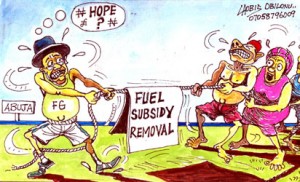The history of Nigeria has for too long been like a bad Nollywood movie. Nigeria is that battered housewife who has taken her beatings quietly, allowed her earnings to be squandered by her wasteful, alcoholic, extravagant, unworthy husband.
Even when we choose our leaders, it seems we choose to stay on our most destructive trend. Our political leaders and our religious leaders often look the same. We flock to pastors who call our children witches, imams who sleep with our daughters, empty suits who take our tithes to buy exotic cars and gallivant around the world, then return to us to preach humility and simplicity. These beatings, these abuses, these insults to our intelligence, we have taken silently.
For decades, nothing has happened. But 2011 has taught us, from Egypt to Tunisia, right down to the most intractable situation in Libya, that in a moment, decades can happen.
Pres. Goodluck Jonathan has decided, upon meeting with faceless stakeholders who apparently do not represent the people who will be most affected, that the most beneficial thing that can be done for the people of this country is for a fuel subsidy to be removed without any cushioning effect.
It is not clear what is most infuriating to Nigerians about this fuel subsidy removal. In the fuel subsidy townhall organized in response to questions of why the government will not wait to improve the capacity of the already-existing refineries with an eye to bolstering the production and reducing the need for the subsidy before removing it, Central Bank Gov. Sanusi Lamido Sanusi and Petroleum Min. Diezani Alison-Madueke insist that the government cannot be trusted on such infrastructure spending, because of failures in the past. According to the Minister of information Labaran Maku, the fuel subsidy is to be removed for the government to find money to invest N1.12 trillion in, yes, infrastructure spending.
But we have irrevocable evidence of why we cannot trust them. We have seen this story before. And they told us themselves.
This government has done nothing to earn our trust. Boko Haram has been striking at will for the past year, and Jonathan’s statements concerning the strikes have been all but encouraging. The economy has continued its lackluster performance. The country’s most pertinent problems — from education to public health, from transportation to infrastructure – have stayed with us, persistent and, we fear, permanent.
Or perhaps what is more infuriating is the fact that Nigerians now face the specter of rising costs on everything. Majority of Nigerians are low-income minimum wage-earners, and they will now find the cost of transportation to and from work take an even larger bite into their monthly salary. The cost of food will increase. The cost of production of goods and services, already high from lack of constant electricity will also rise. Children who rely on school buses to go to school will find some schools discontinuing that service, or increasing the school fees to cover the price hike.
Jonathan and his band of policymakers seemed not to have taken this into account. Yes, there will be some discomfort, allowed Min. Allison-Madueke and Min. Okonjo-Iweala, but Nigerians must accept these difficulties for the greater good. Nigerians must sacrifice.
Perhaps Nigerians’ annoyance is their irony-free usage of the word ‘sacrifice’. When Boko Haram struck on Christmas day, Pres. Jonathan’s statement on the most recent bombings says we must learn to live with the strikes. When the government makes our lives harder, we must also grin and bear it. He and Vice-Pres. Sambo would spend U.S.$15m on personal expenses and billions on food for the Aso Rock kitchen. Never mind, of course, the amount of money that the Nigerian government pays its lawmakers. Wastefulness is to our ‘leaders’, as ‘sacrifice’ is to us.
Nigerians are spoilt for reasons to be angry. And our anger is long overdue.
It is time we demanded from this our leaders. This fuel subsidy will have a radical effect on the cost of living of all Nigerians. If we do not force change on matters most essential to us, then we will never force change.

Okonjo-Iweala agreed that citizens’ cynicism and lack of trust in the government were the reasons for the elongated debate on subsidy removal, insisting that the government was sincere with its policies, The government’s quiet announcement over the long holiday weekend that the subsidy was being ended dissolved our marriage. At least we were still talking about the best outcome for all until FGN spilt first blood.
The Federal Gov and State Govs rule on behalf of those that recycle the cash, so, a complete cycle of corruption that leaves very little else. The FGN spent $8bn on the subsidies in 2010 and gave us the list of who-is-who in Nigeria. A country where 74% of of its budget goes to maintaining the cost of government. Ngozi, What did you expect?